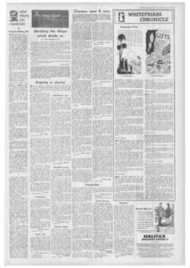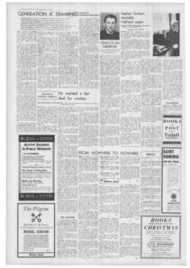Page 6, 11th December 1964
Page 6

Report an error
Noticed an error on this page?If you've noticed an error in this article please click here to report it.
Tags
Share
Related articles
Under The Spell
Happy Ending
" There Will Always Be Poor"
I Empires Traitors And Christ N Action
Biography On A Grand Old Scale
Reviewed by He wanted a fair LAETITIA FAIRFIELD deal for
witches THE DISCOVERIE OF WITCHCRAFT, by Reginald Scot. Introduced by Hugh Ross Williamson (Centaur Classics, £6 6s.).
HIS book is acknowledged to be one of the glories of Elizabethan literature, but it has been reprinted only once since 1665 and then in a limited edition of 250 copies (1886). The first edition issued in 1584 was one of the first books on witchcraft ever written in English and was the very first with a rationalist approach.
The author was a country squire belonging to a wealthy Kentish landed family, no profound scholar but well read, trained in the law and in the
assessment of evidence. Even more important was his intimate knowledge of the countryside, his warm heart and sensitive love of justice.
Like the other courageous folk who tried, at great personal risk, to stem the flood of witch persecutions which swept through Europe between the later fifteenth century and the beginning of the eighteenth, Scot did not deny the existence of witches: but he rejected vehemently the absurd and blasphemous fables believed about their powers.
He was even unconventional enough to insist that accused witches should have a fair deal. This was comine, dangerously near heresy.
Scot had a dry humour and a vigorous pen and his descriptions of the witches "old, lame, Neeseeyed women . . . leenc and deformed, shewing melancholic in their faces" whom he found caught in the net of witch-accusations, have become classics.
Ile showed that a reckless credulity about witchcraft breeds more than individual cruelties, it produces in a whole population an "impatience" with the Providence of God and encourages the dangerous notion (still prevalent throughout Africa) that all natural misfortunes like sickness and death are due to the malice of some vs itch.
Scot planned itis campaign on a wide front and *strove to expose superstition and injustice wherever he found it. He is far too wordy at times, but his pages are a rich source of information about incantations and herbal remedies in current English use besides examples of recipes for transformation into animals and fantastic rituals for evoking spirits found in Continental manuals but apparently rarely an English practice.
For good measure his readers were given seseral astonishing chapters on the art of conjuring: this was the first written account of conjuring in any language and reveals that apparatus and tricks still in use (like cutting a lady's head off) were already favourites in Elizabeth's day.
Modern readers, whatever their religion, may well find that the author's identification of the Catholic faith with the worst features of the witchmania, is vindictive and tasteless. Mr. Ross Williamson correctly points out that there was no effective English legislation against witchcraft until after the Reformation.
Unfortunately he underplays the undeniable responsibility of Pope Innocent VIII (not Honorius!) and the Dominican authors of the Mullahs Maleficarum for opening the floodgates of superstition, and maintaining the pressure. It was Jean Bodin, a Catholic professor. who wrote in 1580 that "presumption and conjecture" are "sufficient proofs" to bring accused witches to torture and death, and the Mal(et's is full of similar hideous doctrines.
Notoriously, it was not only Catholic opponents who resented Scot's book with passion, King James I who (with considerable reason) believed himself to have been in deathly peril from a company of dabblers in black magic, ordered all copies of the Discovcrie to be burnt directly he came to England.
It is less well known that James came ultimately to adopt an attitude very similar to Scot's as a result of his own experiences as an investigator. He too, saved several condemned persons from execution and in the last nine years of his reign only five witches went to the gallows. Realism and moral courage had won a great victory!
It is unfortunate that this reprint is so expensive and disappointing in scope. Mr. Ross Williamson's introduction is good as far as it goes. but there was _room for far more information and annotation on the fascinating text.
blog comments powered by Disqus











